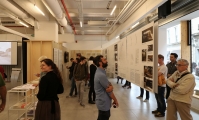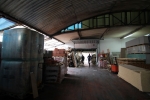Sarah De Boeck's PhD research is part of the interdisciplinary research project: Building Brussels. Brussels city builders and the production of space, 1794-2015, funded by the VUB. She looks at the Brussels construction sector from an urban economic and policy perspective.
Today cities are confronted with the paradox of the results of former functional zoning – originally introduced to protect the viability of urban neighborhoods and to stimulate economic growth by relocating industrial activities to business areas outside the city center – and the disappearance of many small and medium enterprises (SMEs) and their artisanal knowledge with them. Urbanists, heritage managers and policy makers are now pleading for the revaluation of traditional know how, a reintegration of these businesses in the city center and further support for those activities that have remained thus far in the city. This means that a careful planning of former industrial areas within the city is necessary, as well as the re-use of existing industrial heritage. By finding modern technical solutions for the nuisances that expelled these businesses in the past, more attention can be paid to the complementarity of functions reintegrating businesses and their clients, and work and life at short distance to each other. For the Brussels Capital Region in particular, such an approach is crucial to address a double socio-spatial challenge. First of all, the Capital Region is faced with a strong demographic growth, which creates pressure on industrial areas and buildings to be used for housing. Secondly, Brussels is in great need for jobs, as unemployment numbers among its youngsters without advanced or higher education degrees are particularly high.
This IRP will investigate the viability of small and medium enterprises in Brussels from a locational, architectural, business-historical and heritage perspective. The focus will be on the construction sector, where the need for locally anchored and traditionally trained craftsmen and material suppliers is high. The latter strongly participated in the production and construction of urban space. However, they were gradually outranged due to economical evolutions, urban policies and regulations that forced (small) contracting firms, material suppliers and craftsmen to reorganize and relocate their businesses. Paradoxically, today the need for qualified craftsmen and firms as well as knowledge about the local (historical) material resources is urgent due to the growing interest and need for the reuse of buildings, qualitative restoration projects and sustainable urban environments. This research is timely in the light of the actual rezoning of the Canal zone (Kanaalzone) in Brussels and the necessary conservation and re-use of existing industrial heritage in the city center. The IRP will develop an interdisciplinary methodology to trace, understand and evaluate past urban transformations and offer solutions for sustainable future urban development. The results will transcend the case of Brussels and will be applicable to other historical cities as well.
The participants of the 'Building Brussels' research are:
Researchers: Sarah De Boeck (Cosmopolis), Frederik Vandijck (ae-lab) and Matthijs Degraeve (HOST).
Coordinated by Inge Bertels (ae-lab) and co-supervised by Ann Verdonck (ae-lab), Ine Wouters (ae-lab), Stephanie van de Voorde (ae-lab), Heidi Deneweth (HOST), Michael Ryckewaert (Cosmopolis), David Bassens (Cosmopolis), Bas van Heur (Cosmopolis), Peter Scholliers (HIST, ETWIE) and Philippe Sosnowska (ULB CReA).


